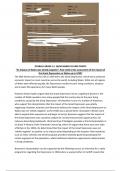OVERALL GRADE A | 56/60 MARKS 93 UMS POINTS
“Its impact on Wales was wholly negative”. How valid is this assessment of the impact of
the Great Depression on Wales up to 1939?
The Wall Street crash in the USA in 1929 led to the Great Depression, which had a profound
economic impact on most countries across the world, including Wales. While not all regions
of Wales were affected equally, the Depression resulted in poor living conditions, diseases
and a lower life expectancy for many Welsh people.
Historian Deian Hopkin argues that the Great Depression led to a significant decline in the
number of Welsh speakers since many people fled the country due to the poor living
conditions caused by the Great Depression. He therefore is one of a number of historians
who support the interpretation that the impact of the Great Depression was wholly
negative[1]. However, historian Josh Brooman believes the impact of the Great Depression on
Wales was not ‘wholly negative’ as the 1930s was a period when ‘all people in Britain were
able to expand their experiences and begin to live’[2]. Brooman suggests that the impact of
the Great Depression was a positive catalyst for societal and personal opportunities, for
instance diversifying livelihoods. Historian Bryn O'Callaghan provides a third interpretation in
his book 'A History of the Twentieth Century'[3], where he argues that there were two sides
of Britain in the 1930s. He determined that the impact of the Great Depression was not
'wholly negative’ or positive, as its impact varied depending on the location. New industries
such as motor vehicles and electrical goods provided relatively good living standards for
certain segments of the population, while traditional industries experienced a deterioration
in living conditions.
Brooman’s interpretation can be supported by the following source, an interview for a radio
programme regarding the Depression in 1938 where a young mother in Cardiff reveals that
, her husband had a job at the docks which paid a good wage, leading to them still having
‘good times’. As Mrs Reason lived through the Depression, her account of the experience is
fairly accurate due to her having a personal experience of it.
[Mrs Catherine Reason, a young mother in Cardiff, being interviewed for a radio programme regarding the
Great Depression in 1938]
Concluding that the impact of the Great Depression on Wales was not ‘wholly negative’ up
to 1939 as the mother informs us that life was not difficult for everyone during the
depression. Overall, I strongly believe the impact of the Great Depression on Wales cannot
be characterised as wholly negative or positive on the entire Welsh population, as it affected
different segments of the population in different ways as traditional heavy industries
declined, whilst newer industries thrived.
Source 1:
[An extract of a medical report written in 1933 by Dr Rankin, Chief Medical Officer for Gelligaer District
Council, demonstrating evidence of the effects of unemployment and poverty.]
During the Great Depression, the high levels of unemployment in Wales had a significant
impact on the country. In 1934, unemployment in Merthyr Tydfil surged to 62%, and in the
Rhondda Valley, the rate of unemployment was four times higher than in Cardiff[4]. Source 1
is valuable as it provides evidence of the devastating effects of mass unemployment on
people from industrial areas. The report reveals that the economic impact of the Great
Depression led to poverty, which subsequently led to the deterioration of the physical and
mental health of those who were affected. As a result of the economic downturn, districts
were left with outbreaks of scarlet fever, with most cases being severe. Unemployed families
often resorted to inexpensive foods such as potatoes, bread, fruit, and fresh milk which
increased the risk of illness, such as scarlet fever shown in Source 1. In 1936, approximately
4.5 million people in Britain had an insufficient diet[5]. Initially, the source is of value as it
provides an insight into the social impact of mass unemployment during the Great
Depression in Wales.




